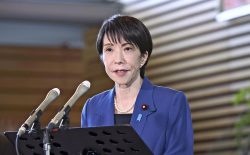- Yomiuri Editorial
- Yen weakest in 20 years
Remain vigilant against rapid fluctuations in exchange rate
13:14 JST, April 17, 2022
The yen is weakening, and the dollar is appreciating rapidly. The government and the Bank of Japan should closely monitor exchange rate trends and scrutinize the impact on the Japanese economy.
On the Tokyo foreign exchange market on Wednesday, the yen plunged to the ¥126 range against the dollar, its weakest level in about 20 years. The yen has depreciated by approximately ¥10 against the dollar in about a month.
Sharp fluctuations in the foreign exchange rate have a major impact on the economy, as they affect prices and make it difficult for companies to formulate business plans, among other possible repercussions. The government and the BOJ need to heighten their vigilance.
The main reason for the yen’s depreciation is the difference in monetary policy between Japan and the United States.
The U.S. Federal Reserve Board is rushing to tighten its monetary policy to control inflation. The Fed lifted its de facto zero-interest rate policy in March and is expected to raise interest rates by a total of 1.75 percentage points by the end of the year. Long-term U.S. interest rates have risen to nearly 3%.
Meanwhile, the increase in Japan’s consumer price index has been sluggish due to the slow economic recovery. The BOJ is continuing its monetary easing policy, guiding long-term interest rates to around 0%. Since it is more advantageous to invest funds in countries with higher interest rates, the dollar is likely to be bought, leading the yen to weaken.
On Wednesday, BOJ Gov. Haruhiko Kuroda stated that the central bank will “persistently continue its strong monetary easing,” a comment that accelerated the yen’s weakening and the dollar’s appreciation.
For the time being, moves to buy the dollar are expected to increase. It is important for the government and the BOJ to send a strong message that exchange rate stability is important for the economy.
Traditionally, a weak yen has been beneficial for the Japanese economy because it has, for example, boosted exports by the manufacturing sector, increasing overseas sales in yen terms and yielding higher profits.
After a long period of struggling due to a strong yen, stock prices and corporate earnings have recovered thanks to the weaker yen, which has been driven by factors including the bold monetary easing measures of the Abenomics economic policies promoted by former Prime Minister Shinzo Abe. The BOJ has not changed its view that the yen’s depreciation is positive for the Japanese economy as a whole.
However, as companies have moved factories overseas, it is argued that the benefits to the Japanese economy from increased exports are smaller than before.
In addition, the costs of resources and food have been rising worldwide, and the Ukraine crisis has exacerbated the surge. Japan relies on imports of these commodities, and a weaker yen will add to the burden.
Households as well as food services and transportation industries, which are related to domestic demand, will be particularly affected. Many in the business community are also lamenting the negative effects of the weak yen.
The government must urgently consider effective support measures for households, small and midsize companies, and others that are suffering from the burden of the yen’s depreciation.
(From The Yomiuri Shimbun, April 17, 2022)
Top Articles in Editorial & Columns
-

40 Million Foreign Visitors to Japan: Urgent Measures Should Be Implemented to Tackle Overtourism
-

University of Tokyo Professor Arrested: Serious Lack of Ethical Sense, Failure of Institutional Governance
-

China Provoked Takaichi into Risky Move of Dissolving House of Representatives, But It’s a Gamble She Just Might Win
-

Riku-Ryu Pair Wins Gold Medal: Their Strong Bond Leads to Major Comeback Victory
-

Policy Measures on Foreign Nationals: How Should Stricter Regulations and Coexistence Be Balanced?
JN ACCESS RANKING
-

Japan PM Takaichi’s Cabinet Resigns en Masse
-

Japan Institute to Use Domestic Commercial Optical Lattice Clock to Set Japan Standard Time
-

Israeli Ambassador to Japan Speaks about Japan’s Role in the Reconstruction of Gaza
-

Man Infected with Measles May Have Come in Contact with Many People in Tokyo, Went to Store, Restaurant Around When Symptoms Emerged
-

Prudential Life Insurance Plans to Fully Compensate for Damages Caused by Fraudulent Actions Without Waiting for Third-Party Committee Review














